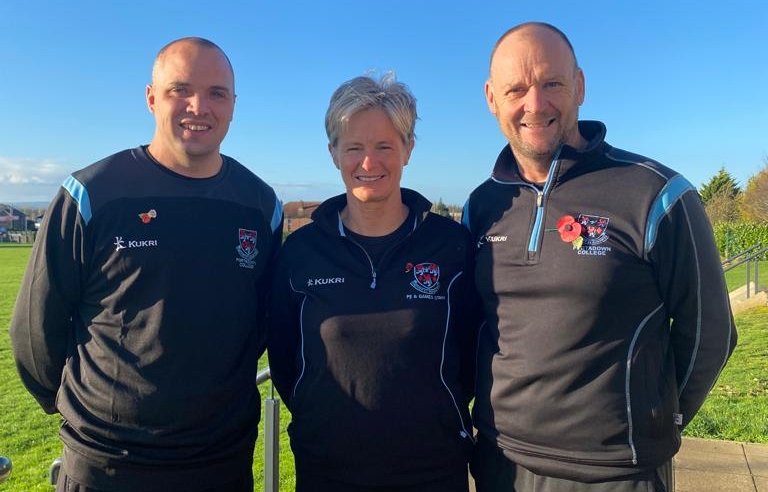Our staff are a dedicated and inspiring team with a wide variety of sporting and examining experience.
Mrs A Symington (Head of Girls’ PE)
Mr A Symington (Head of Boys’ PE)
Mr S McDowell

Our staff are a dedicated and inspiring team with a wide variety of sporting and examining experience.
Mrs A Symington (Head of Girls’ PE)
Mr A Symington (Head of Boys’ PE)
Mr S McDowell
Examination Board: CCEA
GCSE PE is aimed at students who are keen to discover the benefits of leading a balanced healthy lifestyle and who wish to develop peak physical performance in their chosen sports. There are plenty of opportunities to perform practically throughout the course and students are encouraged to try new sports and activities as well as monitor their own lifestyle profile. Students have an opportunity to coach and officiate in addition to taking part in a two day Course in Orienteering at Gosford Forest Park in June of Year 11.
The course follows the CCEA GCSE PE Specification and is focused on promoting students’ physical and mental development. It equips the student with knowledge, understanding and skills to make informed and responsible decisions as contributors to society. Visit the CCEA PE Microsite for more background information.
| Content | Assessment | Weighting |
| Component 1 Factors Underpinning Health and Performance | External Examination 1 hour 15 mins | 25% |
| Component 2 Developing Performance | External written examination 1 hour 15 mins | 25% |
| Component 3A Individual performances in Physical Activities and Sports | Component 3b Students are also assessed on the consistent quality of their analysis and evaluation of their own, or others’ performances from one of their activities | 12.5% per activity |
The three different physical activities can be chosen from the following categories:
Learning the theory aspect of GCSE PE is understood more clearly by those who participate in sport for either competitive or recreational reasons.
GCSE PE opens doors in a variety of areas. The natural progression may be to study PE at A Level and a number of students follow university courses in Sport Science, Physical Education and similar disciplines. PE students have also followed careers in the Health Sciences, Education and Management whilst others have specialised in areas such as Sports Psychology, Strength and Conditioning and Sports’ Therapy.
Examination Board: CCEA
Sports Science and the Active Leisure Industry focuses on relating theory to sport and its impact on performance.
The specification is taught using a combination of teacher guidance and student input, through personal experiences, ideas and debates. Students are required to apply theory to sporting performance, and class input becomes an integral part of teaching and learning. Students are encouraged to learn and research independently and to share resources.
Practical application assists with the understanding of more complex theory from simple group exercises to complex sports testing using scientific laboratories and a visit to the High Performance Centre at the Sports’ Institute of Northern Ireland (SINI), bringing the science of the subject to life.
The subject is linear, with examination in June. Students may take the AS as a stand-alone qualification if they wish. To get the full GCE students must complete both AS and A2. AS and A2 each comprise two units.
| AS Content | Assessment | Weighting |
| Unit 1 Fitness and Training for Sport | Internal Assessment Portfolio showing written evidence of training methods, fitness assessment and planning, leading and evaluating exercise sessions, and risk assessment.
| 60% of AS 30% of A Level |
| Unit 2 The Active Leisure Industry: Health, Fitness and Lifestyle | External Examination
| 40% of AS 20% of A Level |
| A2 Content | Assessment | Weighting |
| Unit 1 Event Management inthe Active Leisure Industry | Internal Assessment Portfolio showing written evidence of planning for an active leisure event and evaluation of outcome. | 30% of A Level |
| Unit 2 The Application of Science to Sports Performance | External Examination
| 20% of A Level |
An active interest in sport is essential for any student wishing to study this course, as confidence is required to devise and lead training programmes.
A qualification in Sports Science and the Active Leisure Industry can lead to a range of careers including:
Entry Requirements
GCSE Grade B is recommended in Physical Education. Alternatively, GCSE Grade B in Biology, together with a genuine interest in sport (i.e. you must be presently playing competitive sport on a regular basis) are also accepted.
Where will PE take me?
The obvious suggestion is to say that it will lead onto one of many of the sports-related degree courses available. However, the real benefit of the PE A Level is that it enables the student to develop a wide range of key skills such as thinking skills, problem solving and decision making skills, independent learning, leadership, collaborative learning, time management and self-confidence.
From scientific research through to debate, A Level PE also develops an organised well rounded student that can cope with the demands of University life. This skill set will stand students in good stead for most University courses.
A Level PE will also prepare you for the workplace. Sport is now such a huge industry where there are endless employment opportunities. A few examples include: coaching, teaching, biomechanics, sports rehabilitation, officiating, sports technology development, sports administration, sports management and media.
Many of our former PE students are pursuing rewarding, interesting and well-paid careers in many different areas of employment. Below are some testimonials from former PC students illustrating examples of the wide range of professions leading on from the study of PE:
If you decide you want to pursue a Sport related degree course, there are many excellent courses available throughout the United Kingdom. Please ask the PE staff and the Careers Department for advice.
Some of the most highly rated courses by students and independent reviewers are listed below:
GCSE
A Level